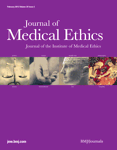
JOURNAL OF MEDICAL ETHICS
Scope & Guideline
Defining the Ethical Boundaries of Healthcare
Introduction
Aims and Scopes
- Clinical Ethics and Patient Care:
The journal emphasizes the ethical dimensions of clinical practice, including issues related to informed consent, end-of-life care, and the rights of patients and healthcare providers. - Healthcare Policy and Social Justice:
It addresses ethical considerations in healthcare policy, particularly concerning equity, access to care, and the impact of social determinants on health outcomes. - Emerging Technologies and Medical Innovation:
The journal explores the ethical implications of new medical technologies, such as AI, genetic engineering, and telemedicine, and their integration into healthcare practices. - Public Health Ethics:
It examines ethical issues related to public health initiatives, including vaccination policies, health equity during pandemics, and the ethical allocation of resources. - Global Health and Cultural Sensitivity:
The journal promotes discussions on global health ethics, highlighting the importance of cultural perspectives and ethical considerations in diverse healthcare settings.
Trending and Emerging
- Artificial Intelligence and Ethics:
There is a growing interest in exploring the ethical implications of AI in healthcare, including issues of trust, decision-making, and the potential for bias in AI algorithms. - Mental Health and Ethical Considerations:
Research increasingly addresses the ethical dimensions of mental health care, particularly concerning autonomy, consent, and the use of technology in mental health interventions. - Ethics in Global Health Initiatives:
Emerging themes focus on global health ethics, emphasizing equitable access to care, the ethics of vaccine distribution, and the challenges posed by cultural diversity. - Environmental Sustainability in Healthcare:
A notable trend is the integration of environmental ethics into medical ethics discussions, particularly regarding the healthcare sector's impact on climate change and sustainable practices. - Patient-Centered Care and Autonomy:
There is an increasing emphasis on patient-centered approaches that respect patient autonomy while recognizing the complexities of informed consent in various medical contexts.
Declining or Waning
- Traditional Bioethics Frameworks:
There is a noticeable decline in articles strictly adhering to traditional bioethical principles (autonomy, beneficence, non-maleficence, justice), as the discourse increasingly shifts towards more dynamic and context-specific ethical considerations. - Historical Case Studies:
The frequency of papers focusing on historical case studies of medical ethics appears to be waning, as contemporary issues take precedence over historical analyses. - Narrowly Defined Medical Ethics:
Research papers that focus solely on narrow aspects of medical ethics without considering broader social, cultural, or technological implications are decreasing, indicating a shift towards more interdisciplinary perspectives. - Regulatory Compliance in Medical Ethics:
There seems to be a reduction in the emphasis on regulatory compliance issues in medical ethics, as the journal increasingly prioritizes discussions on ethical innovation and practice.
Similar Journals

THEORETICAL MEDICINE AND BIOETHICS
Exploring the Frontiers of Medicine and Ethics.THEORETICAL MEDICINE AND BIOETHICS, published by SPRINGER, is an esteemed journal dedicated to exploring the complex intersections of medicine, ethics, and law. With its ISSN 1386-7415 and E-ISSN 1573-1200, this journal serves as a vital platform for scholars, practitioners, and students interested in the ethical implications of medical practices and innovations. Although it currently holds a Q4 impact factor in the categories of Issues, Ethics and Legal Aspects and Medicine (Miscellaneous) as of 2023, its relevance is amplified by its commitment to fostering critical discourse in a rapidly evolving field. The journal features a diverse range of articles that address profound ethical dilemmas in healthcare, making it a significant resource for contemporary research from 1997 to the present. As an open-access journal, it ensures that cutting-edge knowledge is readily available, inviting contributions that challenge conventional thought and advance the field of bioethics.
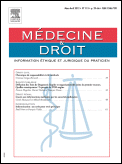
Medecine & Droit
Advancing Knowledge at the Crossroads of Medicine and LawMedecine & Droit, an esteemed journal published by ELSEVIER MASSON, CORP OFF, serves as a vital resource for the intersection of law and medicine. Since its inception in 1995, this journal has facilitated scholarly discourse by publishing innovative research, case studies, and reviews that explore the complexities of legal frameworks impacting medical practice and public health. Although currently classified in the fourth quartile within both the Law and Medicine (miscellaneous) categories for 2023, its contributions are important for legal professionals and healthcare providers seeking to navigate the evolving landscape of medical laws. With an ISSN of 1246-7391 and E-ISSN 1873-6475, it provides essential insights and stimulates interdisciplinary collaboration within academia. Authors and researchers are encouraged to contribute and engage with critical topics shaping the future of medicine and law through this essential publication.
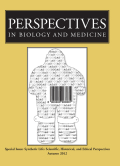
PERSPECTIVES IN BIOLOGY AND MEDICINE
Navigating the Nexus of Science and Health PolicyPERSPECTIVES IN BIOLOGY AND MEDICINE, published by the esteemed Johns Hopkins University Press, has been a cornerstone of interdisciplinary dialogue since its inception in 1957. With a rich history spanning over six decades, this journal delves into the multifaceted interactions between biology and medicine, offering insights that are vital for health policy, ethics, and the philosophy of science. Recognized for its impact, it holds a Q2 ranking in the History and Philosophy of Science category and Q3 rankings in several other relevant fields as of 2023. While not an open-access publication, it provides critical analyses and discussions that are indispensable for researchers, professionals, and students alike. With its committed editorial team, PERSPECTIVES IN BIOLOGY AND MEDICINE continues to foster scholarly engagement and is poised to shape the future discourse in the biosciences.
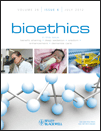
BIOETHICS
Advancing Critical Conversations in Bioethics and Policy.BIOETHICS is a leading academic journal published by Wiley, dedicated to exploring the multifaceted issues at the intersection of healthcare, philosophy, and policy. With an ISSN of 0269-9702 and an E-ISSN of 1467-8519, it has established itself as a critical platform for scholarly discourse since its inception in 1987. The journal holds impressive rankings, featuring in the Q1 category in both Health (social science) and Philosophy, alongside a Q2 rating in Health Policy for 2023. This positions BIOETHICS in the top echelons of its fields, ranking 35th out of 806 in Philosophy and garnering high percentiles across relevant disciplines. By fostering a deeper understanding of ethical implications in medical and social contexts, BIOETHICS serves as an essential resource for researchers, professionals, and students committed to addressing contemporary challenges in health and policy. The journal is accessible through institutional subscriptions and offers an engaging platform for the dissemination of significant research findings and theoretical advancements, paving the way for future exploration in bioethical inquiry.

BioLaw Journal-Rivista di Biodiritto
Exploring the Intersection of Law and BiotechnologyBioLaw Journal-Rivista di Biodiritto, published by UNIV TRENTO, FAC LAW, stands as a vital interdisciplinary platform in the domains of biolaw, biotechnology, and health policy. With an ISSN of 2284-4503 and a burgeoning reputation, this journal encourages critical discussions surrounding the ethical, legal, and social implications of biotechnological advancements from 2014 to 2024. Ranked Q3 in both Biochemistry and Biotechnology, alongside Q2 rankings in Law and Philosophy, it reflects a growing body of scholarship in these experimental fields. Although currently categorized with varying percentile ranks in the Scopus database, it underlines the journal's commitment to nurturing innovative research and interdisciplinary dialogue. The journal promotes open access principles, although the specific access options should be verified for each article. It serves as an indispensable resource for researchers, professionals, and students engaged in the evolving intersection of law and biotechnology, making it a key player in shaping future discourses in bioethics and policy.
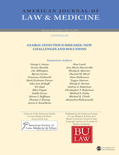
AMERICAN JOURNAL OF LAW & MEDICINE
Advancing Interdisciplinary Dialogue in Law and HealthcareAMERICAN JOURNAL OF LAW & MEDICINE is a prestigious interdisciplinary journal published by Cambridge University Press that bridges the critical intersection of legal and medical scholarship. Since its inception in 1975, this journal has fostered scholarly dialogue surrounding complex legal issues affecting health care and medical ethics, significantly contributing to the fields of law and the social sciences. With its current impact factor highlights showcasing a Q2 ranking in Law and Q3 in Health (Social Science), along with a solid readership base, the journal appeals to researchers, legal professionals, and students alike, offering a platform for impactful research and case studies. Although it does not currently provide Open Access options, the journal continues to prioritize rigorous peer-reviewed content, ensuring that essential discussions on law and medicine remain accessible to its readership. By engaging with contemporary legal and medical issues, the AMERICAN JOURNAL OF LAW & MEDICINE plays a vital role in advancing knowledge and shaping practices within these dynamic fields.
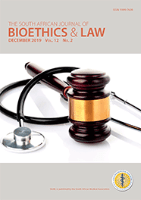
South African Journal of Bioethics and Law
Championing open access to critical bioethical and legal discourse.South African Journal of Bioethics and Law, published by HEALTH & MEDICAL PUBLISHING GROUP, stands as a vital academic platform for discussions at the intersection of bioethics and legal studies. With an ISSN of 1999-7639, this journal has embraced an Open Access model since 2008, ensuring global accessibility for researchers, practitioners, and students alike. Based in South Africa, the journal operates from PRIVATE BAG X1, PINELANDS, CAPE TOWN 7430, and features diverse articles that span a multitude of pertinent topics across health professions, law, and public health. It proudly holds a Q3 ranking in Health Professions and Law sectors, affirming its status within the scholarly community. Notably, for the year 2023, it has achieved impressive placements in Scopus ranks, reinforcing its commitment to disseminating high-quality research and fostering dialogues that influence policy and practice in these critical domains. Researchers exploring the intricate ethical and legal dimensions of healthcare will find this journal an indispensable resource.

BMJ-British Medical Journal
Your trusted source for groundbreaking medical research.BMJ-British Medical Journal, published by the esteemed BMJ PUBLISHING GROUP, is a leading academic journal in the field of medicine, specifically categorized within the top Tier Q1 in Medicine (miscellaneous) based on the 2023 rankings. Recognized for its significant impact, BMJ holds an impressive rank of #15 out of 636 in General Medicine, placing it in the 97th percentile among its peers. With a legacy dating back to 1857, this journal continues to foster critical discussions and disseminate high-quality research aimed at advancing clinical practice and healthcare policy. While currently not an open-access journal, its rigorous peer-review process ensures that every publication meets the highest standards of scientific integrity and relevance. Situated in the heart of London at the British Medical Association House, the BMJ remains an essential resource for researchers, healthcare professionals, and students alike, dedicated to sharing impactful findings and innovative medical insights.
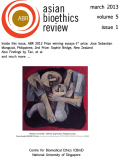
Asian Bioethics Review
Illuminating the Path of Ethical Healthcare PracticesAsian Bioethics Review, published by SPRINGER, is a premier journal indexed with ISSN 1793-8759 and E-ISSN 1793-9453, dedicated to advancing discourse in the interdisciplinary field of bioethics across Asia and beyond. Established in 2015, this esteemed publication has rapidly gained recognition, achieving a Q1 ranking in Philosophy and Q2 in key categories such as Health Policy and Issues, Ethics and Legal Aspects in 2023. With its robust Scopus rankings highlighting its significance across diverse domains—including a remarkable 98th percentile ranking in Philosophy—the journal serves as a vital platform for researchers, ethicists, and policymakers to explore pressing ethical issues and contribute to policy development in health and social sciences. Although not open access, the journal ensures a wide reach through institutional subscriptions, making it an essential resource for students and professionals committed to ethical practices in healthcare. Set in the dynamic backdrop of Singapore, "Asian Bioethics Review" continues to shape the conversation around bioethical practices in the Asian context and globally.

Acta Bioethica
Championing Ethical Practices in Diverse Health ContextsActa Bioethica is a pivotal open access journal published by the Universidad de Chile's Centro Interdisciplinario de Estudios Bioética, dedicated to the multidisciplinary exploration of bioethical issues in health policy and social sciences. Since its inception in 2000, the journal has fostered dialogue among researchers, professionals, and students, addressing the complexities of ethical practices in diverse health contexts. With an impressive commitment to accessibility, Acta Bioethica has become a vital resource for those engaged in understanding the ethics of healthcare in Latin America and beyond. Although currently ranked in the lower quartiles of Scopus in both health policy and social sciences, the journal is steadily gaining recognition for its unique contributions to bioethics. The journal accepts contributions in both English and Spanish, ensuring a wider reach and impact in the academic community. Located in Santiago, Chile, and active from 2007 to 2024, Acta Bioethica continues to be an essential platform for advancing research and discussions in the ever-evolving field of bioethics.